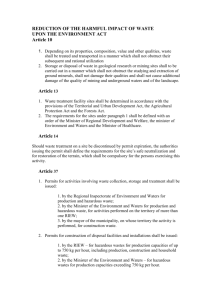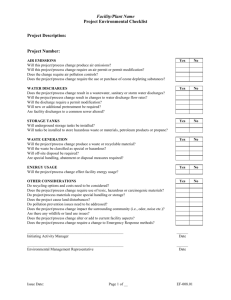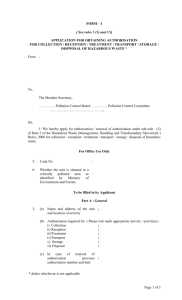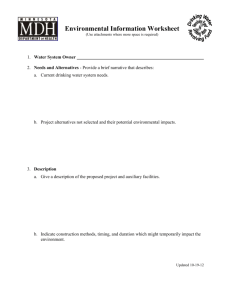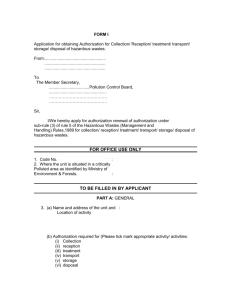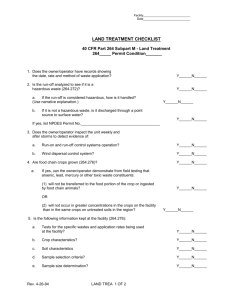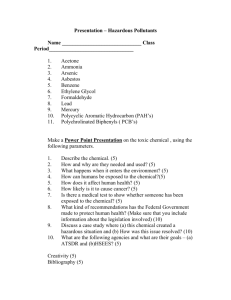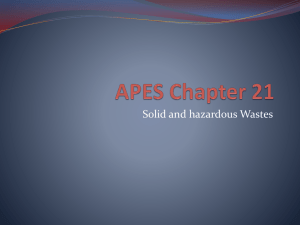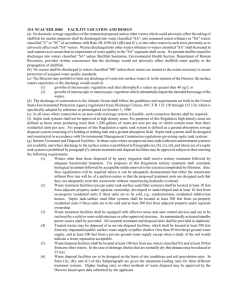REDUCTION OF THE HARMFUL IMPACT OF WASTE
advertisement
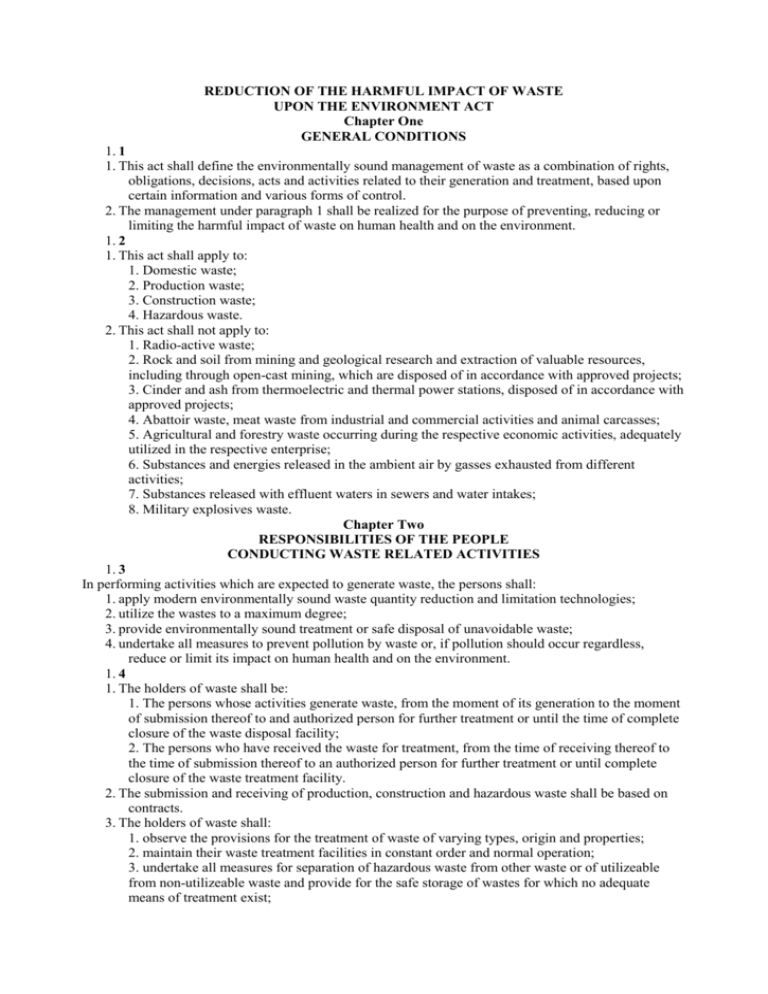
REDUCTION OF THE HARMFUL IMPACT OF WASTE UPON THE ENVIRONMENT ACT Chapter One GENERAL CONDITIONS 1. 1 1. This act shall define the environmentally sound management of waste as a combination of rights, obligations, decisions, acts and activities related to their generation and treatment, based upon certain information and various forms of control. 2. The management under paragraph 1 shall be realized for the purpose of preventing, reducing or limiting the harmful impact of waste on human health and on the environment. 1. 2 1. This act shall apply to: 1. Domestic waste; 2. Production waste; 3. Construction waste; 4. Hazardous waste. 2. This act shall not apply to: 1. Radio-active waste; 2. Rock and soil from mining and geological research and extraction of valuable resources, including through open-cast mining, which are disposed of in accordance with approved projects; 3. Cinder and ash from thermoelectric and thermal power stations, disposed of in accordance with approved projects; 4. Abattoir waste, meat waste from industrial and commercial activities and animal carcasses; 5. Agricultural and forestry waste occurring during the respective economic activities, adequately utilized in the respective enterprise; 6. Substances and energies released in the ambient air by gasses exhausted from different activities; 7. Substances released with effluent waters in sewers and water intakes; 8. Military explosives waste. Chapter Two RESPONSIBILITIES OF THE PEOPLE CONDUCTING WASTE RELATED ACTIVITIES 1. 3 In performing activities which are expected to generate waste, the persons shall: 1. apply modern environmentally sound waste quantity reduction and limitation technologies; 2. utilize the wastes to a maximum degree; 3. provide environmentally sound treatment or safe disposal of unavoidable waste; 4. undertake all measures to prevent pollution by waste or, if pollution should occur regardless, reduce or limit its impact on human health and on the environment. 1. 4 1. The holders of waste shall be: 1. The persons whose activities generate waste, from the moment of its generation to the moment of submission thereof to and authorized person for further treatment or until the time of complete closure of the waste disposal facility; 2. The persons who have received the waste for treatment, from the time of receiving thereof to the time of submission thereof to an authorized person for further treatment or until complete closure of the waste treatment facility. 2. The submission and receiving of production, construction and hazardous waste shall be based on contracts. 3. The holders of waste shall: 1. observe the provisions for the treatment of waste of varying types, origin and properties; 2. maintain their waste treatment facilities in constant order and normal operation; 3. undertake all measures for separation of hazardous waste from other waste or of utilizeable from non-utilizeable waste and provide for the safe storage of wastes for which no adequate means of treatment exist; 4. in the event of hazardous waste, order the appointment of a person responsible for the management thereof; 5. keep records of the waste as defined herewith; 6. provide upon request access of inspection authorities to the waste generating processes, waste treatment facilities and waste related documents; 7. provide instructions and periodical training of the hazardous waste handling staff; 8. make provisions for and realize the necessary waste restriction measures following closure of sites and activities. 4. The holders of waste shall be responsible for: 1. environmental quality damages pursuant to Article 5 of the Environmental Protection Act; 2. the health and safety of personnel. 1. 5 The wastes shall be disposed of within sites defined in accordance hereof. 1. 6 All sites where hazardous waste is generated or disposed of shall be subject to environmental impact assessment (EIA) in accordance with the Environmental Protection Act. 1. 7 Prior to appointing a state acceptance committee for sites whose operation generates waste, the site owner shall submit to the municipality and the Regional Inspectorate of Environment and Waters (RIEW) information documenting the following: 1. The quantity, composition and properties of expected waste; 2. A permit for waste treatment and for the manner in which this treatment shall be carried out; 3. The person authorized to take charge of the activities under item 2. 1. 8 The expenses for waste analysis and study for confirmation of the declared data and the proper functioning of the facilities shall be at the expense of the holders. 1. 9 1. Should the generators of waste be unknown, the environmental quality restoration expenses shall be assumed by the persons who are the actual holders of the waste until the perpetrator is ascertained. 2. All expenses for environmental quality restoration and ascertaining of the actual perpetrator shall be borne thereby. 3. If the perpetrator can not be established, the affected natural persons may receive assistance by the municipality, and in the event of hazardous waste pollution, from the National Environmental Protection Fund. Chapter Three TREATMENT OF WASTE 1. 10 1. Depending on its properties, composition, value and other qualities, waste shall be treated and transported in a manner which shall not obstruct their subsequent and rational utilization 2. Storage or disposal of waste in geological research or mining sites shall to be carried out in a manner which shall not obstruct the studying and extraction of ground minerals, shall not damage their qualities and shall not cause additional damage of the quality of mining and underground waters and of the landscape. 1. 11 The expenses for waste treatment and transportation shall be borne by the generators unless agreed otherwise. 1. 12 1. The collection, storage or disposal of waste shall require permits issued in accordance herewith. 2. Permits shall not be required when the waste has no hazardous properties and does not exceed 0.100 cubic meters per twenty-four hours. 1. 13 1. Waste treatment facility sites shall be determined in accordance with the provisions of the Territorial and Urban Development Act, the Agricultural Protection Act and the Forests Act. 2. The requirements for the sites under paragraph 1 shall be defined with an order of the Minister of Regional Development and Welfare, the minister of Environment and Waters and the Minister of Healthcare. 1. 14 Should waste treatment on a site be discontinued by permit expiration, the authorities issuing the permit shall define the requirements for the site’s safe neutralization and for restoration of the terrain, which shall be compulsory for the persons exercising this activity. 1. 15 The domestic waste disposal facilities and installations shall be constructed and operated in a manner which shall not pose threats of environmental pollution or damage. The conditions are requirements for their construction and operation shall be defined with orders of the Minister of Regional Development and Welfare, the Minister of the Environment and Waters, and the Minister of Healthcare. 1. 16 The persons conducting domestic waste disposal shall inform the mayor of the municipality on whose area the activity is conducted, about exhaustion of the landfill capacity or expiry of the service life of the installation at least 2 years in advance. 1. 17 1. The wastes from temporary construction sites or from demolition or rehabilitation of buildings shall be treated and transported by the waste holders, the performers of the construction or the demolition work or by another person on the basis of a contract. 2. The mayor of the municipality shall allocate a disposal site, the manner of disposal and reclamation of the area after completion of disposal, and the waste transport route. 1. 18 1. Within 12 months as of enactment hereof, the municipal councils shall adopt regulations setting forth the procedures and conditions for: 1. disposal, collection, including separate collection, transportation, transferring, neutralization and utilization of domestic and construction waste on their area; 2. payment for various services under the effective legislation. 2. The municipalities may allow waste holders to transport their domestic and construction waste to the relevant disposal sites. 1. 19 Domestic waste from air, water and passenger overland transport vehicles shall be removed upon entry into the country and shall be disposed of at the border check-points. 1. 20 The production wastes without hazardous properties shall be treated: 1. by the generator using their own facilities in accordance with approved production activity projects and under the conditions of Article 4, paragraph 3; 2. by persons with permits issued under the conditions of Article 37. 1. 21 1. Hazardous wastes shall be treated only under a permit issued in accordance with Article 37, items 1 and 2. 2. Hazardous wastes shall be separately collected and temporarily stored in the premises of the holder in special containers. 3. Hazardous wastes shall be packed, labeled and transported in conformity with the generally accepted and recognized international rules and standards, while accounting for the relevant internationally recognized practice. 1. 22 1. Prior to commissioning of hazardous waste disposal sites, the owners thereof shall inform the Ministry of Environment and Waters of this at least 1 month prior to the meeting of the acceptance committee. 2. Upon notification under paragraph 1, the site owner shall submit: 1. Information on a. composition and quantity of treated waste; b. composition and quantity of the final product; c. quality of emissions in air and water; d. availability of trained personnel e. laboratory equipment; f. necessary auxiliary materials and facilities; 2. testing protocols for the individual technological processes; 3. a site allocation document; 4. other data needed for the state acceptance and allowing the use of construction work within the Republic of Bulgaria. 1. 23 1. The hazardous and production waste treatment and transportation requirements shall be set forth within regulations issued by the Council of Ministers 2. The classification of waste shall be determined with an order of the Minister of Environment and Waters and the Minister of Healthcare, and shall be promulgated in the State Gazette. Chapter Four MANAGEMENT OF WASTE RELATED ACTIVITIES Section One Information on Waste Related Activities 1. 24 1. The persons whose activities generate non-hazardous waste in quantities exceeding 100 kg or 0.100 cubic meters within 24 hours or hazardous waste, and the persons disposing of waste, shall keep waste record books verified by the RIEWs. 2. In case of termination of the operation of individual installations or facilities, the persons under paragraph 1 shall keep the accounting books for the household and production non-hazardous waste for a period of 5 years and for a period of 30 years for hazardous waste. 3. In case of complete closure of the operation of all facilities and equipment on a site, the persons under paragraph 1 shall submit the accounting books for storage at the municipalities for the periods provided for under paragraph 2. 4. The persons under paragraph 1 shall prepare and submit to the RIEWs annual waste reports. 1. 25 The Ministry of the Environment and Waters shall keep a register for the issued permits and for the closed sites and activities. 1. 26 All documents related to the reports and waste activity management information shall be prepared following the procedure defined with a regulation by the Minister of the Environment and Waters, Minister of Regional Development and Welfare and the Minister of Healthcare. Section Two Programs 1. 27 The Ministry of the Environment and Waters along with other interested agencies shall prepare and submit to the Council of Ministers a “National Waste Management Program”. The implementation of the program shall reported upon to the Council of Ministers annually. The program shall be updated as necessary. 1. 28 1. The waste related activity programs shall be drafted and approved by: 1. the municipal councils for the territory thereof within 12 months as of enactment hereof; 2. the persons whose activities are related to collection, storage, and neutralization of waste; 3. the persons whose activities generate production waste in quantities exceeding 2 cubic meters within twenty-four hours or hazardous waste. 2. The programs under paragraph 1 shall be developed for long periods depending on the expected development of production and other activities, but not shorter than 1 year. 1. 29 1. The mayors of municipalities and the persons under article 28, paragraph 1, items 2 and 3 shall submit a draft program to RIEW. 2. Within 60 days, the RIEWs shall approve the submitted drafts or shall return those with compulsory prescriptions for achieving compliance hereto. 3. A copy of the program shall be submitted to the RIEW within 1 month as of their adoption. 1. 30 1. The programs shall provide for measures aimed at the following objectives: 1. decreasing or limitation of waste generation and the degree of hazard thereof; 2. recycling, regeneration, or other forms of utilization; 3. environmentally sound neutralization; 4. cleaning of past waste pollution. 2. The programs for waste related activity management shall include: 1. analysis of the state and a prediction of the type, properties and quantities of wastes generated and pending treatment; 2. the goals, stages, and deadlines for their implementation; 3. the manner of and facilities for treatment or safe storage; 4. description of the specialized treatment facilities and of the terrains appropriate for waste treatment; 5. scheme for the movement of waste towards the treatment facilities; 6. area or facility specific waste related activity management decisions; 7. program implementation resources; 8. measures for support and rationalization of the waste related activity management; 9. co-ordination with other programs related to the activity; 10. implementation reporting and control system; 11. result evaluation and program updating system. 3. Upon development of waste related activity management programs in the municipalities, representatives of public environmental movements and organizations shall be involved. 1. The area development plans shall note the sites with facilities and terrains under paragraph 2, items 3 and 4. 1. 31 1. The annual waste management activity and the implementation of programs shall be reported during the first quarter of the subsequent year and a copy of the report shall be sent to the Regional Inspectorates of Environment and Waters. 2. The Ministry of the Environment and Waters shall prepare an annual report for the waste related activity management in Bulgaria which shall be included in the report on the state of the environment under Article 4 of the Environmental Protection Act. Section Three Assistance of Waste Related Activities 1. 32 1. The state shall assist the management of waste through providing conditions for: 1. environmentally sound treatment of wastes; 2. reduction or limitation of the quantities of domestic or production generated wastes; 3. reuse of valuable components or the properties of the wastes. 1. 33 Upon a proposal by the Minister of Territorial Development and Welfare and the Minister of the Environment and Waters, the State Budget Act shall allocate annual resources earmarked for construction of facilities and installations for treatment of solid domestic waste and widely spread hazardous waste, and for cleaning up and reclamation of past waste pollution sites. 1. 34 The Council of Ministers shall regulates the conditions for utilization and the prices of certain waste types in order to stimulate separate collection, re-use and recycling thereof. 1. 35 1. Entered under a special item of the National Environmental Protection Fund shall be: 1. the amounts of fees under Article 55 for permits issued by the Ministry of the Environment and Waters and the Regional Inspectorates of Environment and Waters; 2. the amounts of fees under Article 36; 3. the amounts of fines and sanctions under Chapter Six, when the punitive ordinances are issued by the Minister of Environment and Waters or by persons authorized thereby. 2. Entered under a special item of the Municipal Environmental Protection Funds shall be: 1. the amounts of fees under Article 55 for permits issued by the municipal bodies; 2. the amounts of fines and sanctions under Chapter Five, when the punitive ordinances are issued by the mayors of the municipalities or by persons authorized thereby. 3. The funds under paragraphs 1 and 2 shall be expended only for waste treatment projects and sites. 1. 36 1. Products which generate widely spread wastes during the production or final use thereof, shall be subject to fees. 2. The fees shall be defined in a tariff approved by the Council of Ministers. Chapter Five PERMISSION AND CONTROL OF WASTE ACTIVITIES Section One Permits 1. 37 1. Permits for activities involving waste collection, storage and treatment shall be issued: 1. by the Regional Inspectorate of Environment and Waters for production and hazardous waste; 2. by the Minister of the Environment and Waters for production and hazardous waste, for activities performed on the territory of more than one RIEW; 3. by the mayor of the municipality, on whose territory the activity is performed, for construction waste. 1. Permits for construction of disposal facilities and installations shall be issued: 1. by the RIEW – for hazardous wastes for production capacities of up to 750 kg per hour, including production, construction and household waste; 2. by the Minister of the Environment and Waters – for hazardous wastes for production capacities exceeding 750 kg per hour. 1. 38 The collection, transportation, storage or neutralization of household waste shall be performed by persons to whom concessions have been granted pursuant to Chapter Eight of the Municipal Property Act and by persons defined under §9 therein. 1. 39 1. Permits under Article 37, paragraph 1 shall be issued following application containing: 1. the activities applied for; 2. the type, composition, properties, quantity and origin of the waste to be treated; 3. the methods and technologies to be implemented; 4. the equipment and installations to be used; 5. a list of necessary staff by positions, responsibilities, qualifications and numbers; 6. the safety measures to be undertaken; 7. the person responsible for management, address, telephone, and fax for contact. 2. Attached to the application shall be: 1. the receipt for a paid fee; 2. a list of customers to be serviced; 3. a draft activity management program; 4. a certified transcript of the applicant’s court registration; 5. a declaration by the applicant concerning previous violations hereof; 6. the bank guarantee for the activity; 7. for hazardous waste – the sanitary conclusion of the competent authority of the Ministry of Healthcare. 1. 40 1. Permits under Article 37, paragraph 2, shall be subject to applications stating: 1. the type, composition, quantity, and origin of the waste to be treated; 2. suggested final products of the treatment and their type, composition, properties, and quantity; 3. methods of technology to be implemented; 4. a list of necessary staff by positions, responsibilities, qualifications and numbers; 6. the person responsible for management, address, telephone, and fax for contact. 2. Attached to the application shall be: 1. the receipt for a paid fee; 2. a list of customers to be serviced; 3. for hazardous waste – the sanitary conclusion of the competent authority of the Ministry of Healthcare for production capacity exceeding 750 kg per hour or by the Inspectorates of Hygiene and Epidemiology for production capacities of up to and including 750 kg per hour. 4. a certified transcript of the applicant’s court registration; 5. a declaration by the applicant for not having violated this Act; 6. the annual accounting reports for the last two years; 7. the project with a disposal technology; 8. the project for final reclamation and care for the site following the termination of activities; 9. the emergency plan; 10. the final decision concerning the Environmental Impact Assessment; 11. the site allocation document; 12. the permit for performance of activities under Article 37, paragraph 1. 1. 41 The authorities under Article 37 may demand of the applicant additional information in writing, necessary for decision making. 1. 42 1. The authorities under Article 37 shall assess the conformity of the permit application with the requirements hereof. 2. If the submitted documents are not complete or do not meet the compulsory requirements, or if additional information is needed, the competent authorities shall inform the applicant within 60 days as of the receipt of the request. 3. Within 60 days of the notification under paragraph 2, the applicant shall remove the inadequacies and non-conformities. 1. 43 1. The authority to which the application is submitted shall pass judgment within 6 months as of receipt of the application or as of removal of inadequacies or non-conformities. 2. The decision shall allow issuance of permit or shall provide for a motivated refusal for permit issuance if the proposal does not meet the regulatory requirements and in the cases when permitted and adequate treatment capacities exist for the disposal of the envisaged wastes. 1. 44 The permits shall be issued for 1 to 5 years. 1. 45 1. At least six months prior to expiry of the permit, the persons shall apply for permit continuation. 2. The persons shall attach to the application under paragraph 1 a declaration stating that no changes have occurred of the conditions under which the permit had been issued. 3. The competent authority shall pass a decision on the application for permit continuation within 2 months. 1. 46 1. The issued permit shall be amended and supplemented by the competent authority in the following cases: 1. upon amendment of the regulatory requirements related to permits; 2. upon pending changes of raw materials or processes resulting in changes of quantities, composition and properties of wastes; 3. upon pending changes of the composition and properties of hazardous wastes received for treatment in a facility, or changes of the treatment processes. 2. In the cases under paragraph 1, items 2 and 3, the persons shall submit permit amendment applications not later than 3 months prior to the change. 1. The competent authority shall pass a decision on the permit amendment application within 2 months. 2. In case of rejection of the application under paragraph 2, the persons shall apply for new permits following the procedures hereof. 1. 47 The issued permits and the open procedure of issuing thereof may not be transferred or ceded to other persons. 1. 48 The competent authority shall withdraw the issued permit if: 1. untrue information is submitted as grounds for permit issuance; 2. the public health is endangered or the environment is damaged or polluted above the allowable standards in result of gross of systematic violations hereof or of the regulations on the implementation hereof. 3. the conditions defined in the permit are not met. 1. 49 The decisions of the competent authorities shall be announced to the applicants in writing within 7 days as of their issuance. 1. 50 The decisions of the competent authorities for permit issuance, changing and supplementing or for refusal of permit issuance, changing or supplementing shall be appealed against following the procedures of the Administrative Procedures Act. Section Two Import, Export and Transit of Waste 1. 51 1. The import, export and transit of waste through the Republic of Bulgaria shall be allowed under observation of the safety requirements and a permission by the Minister of the Environment and Waters: 1. for import and transit – in all cases unless otherwise provided in international agreements; 2. for export – if provided for in international agreements. 2. The conditions and the procedures for the issuance of permits under paragraph 1 and the cases requiring establishment of bank guarantees, shall be defined in an ordinance of the Minister of Environment and Waters. 1. 52 Import of waste within the Republic of Bulgaria shall be allowed in exceptional cases and under observation of the following conditions: 1. imported wastes shall be used only for the needs of production if end-user contracts are available; 2. agreement by a decision of the Municipal Council to accept wastes on the territory of the municipality where the processing facility is located; 3. the persons who shall process the wastes must possess a permit for this activity; 4. the wastes must have their physico-chemical composition determined precisely and must be accompanied by the necessary documents including a specification, certificate and an invoice; 5. the use of wastes in the relevant production processes should produce smaller quantities of waste than the use of traditional raw materials or shall replace valuable or limited natural resources; 6. the wastes must be stored and processed for a period not longer than 6 months and in a way excluding risks to human health and to the environment; 1. 53 1. No exports of waste shall be allowed without the written consent of the competent authorities of the importing state and of the states through the territory of which the waste shall be transported, if so required under international agreement effective for the Republic of Bulgaria. 2. Should the importing state or in the states through which the wastes shall be transported refuse to accept the exported wastes, the waste exporter shall provide for the safe disposal of the waste at his own expense. 1. 54 1. No transit conveyance of wastes shall be allowed without the written consent of the competent authorities of the importing state, the exporting state, and the states through which the transit conveyance shall be carried out. 2. The consent of the exporting state and the states through which the transit conveyance will be carried out shall also entail a responsibility for the acceptance of the load in the event of nonacceptance of the load by any of the states. 1. 55 Should violations in the import, export and transit conveyance of wastes be established, the customs authorities and the border control authorities of the Committee for Standardization and Metrology shall stop the violators and immediately shall inform the Ministry of Environment and Waters and the authorities of the Ministry of Internal Affairs and the Civil Protection Department. 1. 56 The permits under Sections I and II under Chapter Five shall be issued against fees determined in accordance with a tariff approved by the Council of Ministers. Section Three Control of Waste Management 1. 57 The mayors of the municipalities and the persons authorized by therefrom shall control: 1. the generation, collection, storage, transportation, and treatment of household and construction waste, and the implementation of programs for management thereof; 2. the disposal of production and hazardous waste and the implementation of programs for management thereof; 3. the facilities and installations for household and construction waste storage and neutralization, and for industrial and hazardous waste disposal; 4. the observation of other requirements defined by the provisions under Article 18. 1. 58 1. The Regional Inspectorates of Environment and Waters shall inspect the compliance with the waste treatment requirements and with the conditions of the permits concerning: 1. the generation, collection, storage, movement, and treatment of waste; 2. the facilities and installations for waste storage and neutralization; 3. movement of wastes within their own area. 2. The Regional Inspectorates of Environment and Waters shall control the accountability and the submission of information under Chapter Four, Section I. 1. 59 The Ministry of the Environment and Waters shall control the observation of the conditions in permits under Chapter Five, Section I and the treatment of wastes when carried out in the region of more than one RIEW, and the programs for management of such activities. 1. 60 The Inspectorate of Hygiene and Epidemiology shall exercise sanitary control of hazardous waste neutralization activities. 1. 61 The customs authorities and the border control authorities of the Committee of Standardization and Metrology shall control the conformity of loads to the supporting documents and the observation of the requirements for import, export and transit conveyance of wastes to the extent of their competencies under the effective legislation. Chapter Six ADMINISTRATIVE PUNITIVE REGULATIONS Section One Compulsory Administrative Measures 1. 62 To prevent and discontinue the administrative violations hereof and to prevent and discontinue their harmful consequences, the competent authorities or the persons authorized thereby may impose compulsory administrative measures in accordance with Article 63. 1. 63 1. The Minister of the Environment and Waters shall terminate: 1. the collection, storage or treatment of hazardous wastes; 2. the construction and operation of hazardous waste disposal installations. 2. The director of the Regional Inspectorate of Environment and Waters shall: 1. issue prescriptions concerning the construction of household waste neutralization installations; 2. terminate waste treatment and transportation activities; 3. terminate the operation of waste treatment installations. 3. The mayor of the municipality shall: 1. stops or terminate the construction of household waste neutralization installations; 2. terminate the disposal of wastes within the municipality; 3. put transport vehicles out of operation when the transportation of wastes contravenes the effective provisions and the contract with the municipality. 1. 64 The compulsory administrative measures may be appealed against as set out in the Administrative Procedures Act. Section Two Administrative Violations and Punishment 1. 65 1. Fines from 50 000 to 500 000 levs shall be imposed on natural persons who: 1. dispose of waste in locations not authorized for the purpose; 2. violates the construction waste disposal regulations related to the landfills for such waste. 2. In the event of repeated violation, a fine of twice the amount shall be imposed upon the natural person. 1. 66 1. Fines, respectively, property sanctions shall be imposed upon sole traders and/or legal persons who: 1. commit a violation under Article 65, paragraph 1, items 1 and 2; 2. violate the procedures and the conditions for submission, collection, conveyance, transferring, neutralization, separate collection and utilization of household and construction waste in accordance with the requirements of the local regulations; 3. construct and operate household disposal facilities in a manner threatening pollution or damage to the environment; 4. violate the construction waste treatment and conveyance regulations; 5. treat hazardous and other waste without a permit, if required, or fail to observe the conditions of the issued permit, and violate the provisions for separate collection, temporary storage and transportation of waste; 6. violates the regulations for commissioning of hazardous waste disposal sites, including the permit amendment and supplementing provisions; 7. does not keep a register of waste in accordance with the requirements hereof; 8. imports, exports and transits wastes without a permit if required. 2. For violations under items 1 and 7 fines or property sanctions shall be imposed amounting to 100 000 to 2 000 000 levs, and in the other cases the amounts are 500 000 to 5 000 000 levs. 1. In the case of repeated violation the fine, or, respectively, the sanction under paragraph 2 shall be doubled. 1. 67 A fine of 100 000 to 2 000 000 levs shall be imposed upon an official who: 1. allows commissioning of waste generating sites without the site acceptance requirements having been met; 2. issues a permit for collection, storage and treatment of waste in violation hereof; 3. fails to carry out the necessary activities when the waste generators are unknown; 4. violates the existing waste disposal site allocation provisions; 5. fails to observe his obligations to determine the requirements for safe discontinuation of activities and terrain reclamation following the termination of the waste treatment activity; 6. permits the commissioning for hazardous waste facilities without the requirements hereof having been met. 1. 68 1. The violations under Articles 65 and 66 shall be established with an act drawn up by an official appointed by the Minister of the Environment and Waters or the mayor of the municipality. The penalty ordinances shall be issued by the Minister of Environment and Waters, or the mayor of the municipality, or the persons authorized thereby. 2. The violations under Article 67 shall be established with an act drawn up by an official appointed by the Minister of the Environment and Waters, and the penalty ordinances shall be issued by the Minister of Environment and Waters. 3. The establishing of violations, issuance, appealing and amending the penalty ordinances shall be conducted following the procedures of the Administrative Violations and Penalties Act. Additional Provisions 1. 1 Pursuant hereto: 1. “Waste” shall be a substance, object or part thereof without a preliminary immediate application or which its owner wishes to or must relieve of. The substances, objects or parts of objects, submitted by the owner or by a person authorized by the owner to the specialized waste treatment companies, shall also be defined as waste until such time, when the materials restored therefrom or the energy produced thereby shall become included in the production process; 2. “Household waste” shall be the waste resulting from the activities of people in homes, in administrative and social and public buildings. Included here shall be also wastes from commercial outlets, crafts, resort and entertainment facilities, which are not hazardous and at the same time, their quantity or composition shall not obstruct their treatment together with household waste; 3. “Industrial waste” shall be the waste formed as a result of industrial activities, crafts and services by natural and legal persons; 4. “Hazardous waste” shall be the waste whose composition, quantity and properties create risks to human health and the environment and is defined as such under the Convention for Control of Trans-boundary Movement of Hazardous Waste and its Disposal; 5. “Construction waste” shall be the waste resulting from construction activities on construction sites and waste from demolition or reconstruction of buildings and facilities; 6. “Generator of waste” shall be a natural or legal person whose activities generate waste; 7. “Waste treatment” shall be the collection, transportation, storage and disposal of waste and all intermediate operations, as well as their re-use, recycling and recovery or production of energy and materials from waste; 8. “Waste disposal” shall be such effect on waste (disposal, recycling, incineration, neutralization, etc.) which does not cause exceedance of the established standards for human health or environmental pollution; 9. “Recycling of waste” shall be activity for restoration or renewal of the properties as raw material thereof; 10. “Waste processing” shall be an activity changing the properties or composition of waste, transforming it into raw materials for the production of end products or into end products; 11. “Waste disposal” shall be storage of waste for more than 6 months in a manner which does not represent a threat to the human health and the environment and no further treatment of waste is envisioned; 12. “Widespread waste” shall be waste generated following use of products from numerous sources throughout the country and whose characteristics require special management. 13. “Repeated” shall be violations committed within one year as of enactment of the punitive ordinance imposed upon the violator for identical violation. §2 The Ministry of Environment and Waters shall be a national competent authority and a coordinator of all international agreements related to the subject hereof, to which the Republic of Bulgaria is a party. Transitional and Concluding Provisions §3 The persons carrying out activities requiring permits pursuant to Article 37 hereof shall submit a permit application within 6 months as of enactment hereof. §4 This Act shall revoke Decree 1541 on the Utilization of Utility Refuse (promulgated State Gazette, issue 41/1983, amended, 56/1986) §5 The following amendments shall be made to Article 7 of the Environmental Protection Act (promulgated SG 86/1991, amended 90/1991, amended 100/1992, 31/1995, 63/1995 and 13/1997): 1. In paragraph 1, item 2, the words “or recycling” shall be deleted, and the comma following word “disposal” shall be replaced by “or”. 2. Paragraph 2 shall be changed as follows: “(2) Transit conveyance of waste and hazardous substances through the territory and marine space of the Republic of Bulgaria shall be permitted by the Minister of the Environment and Waters for each individual case, unless otherwise provided in international agreements effective for the Republic of Bulgaria.” §6 In §2 of the Transitional Provisions of the State Fees Act (promulgated in the Izvestia newspaper, issue 104/1951, amended and supplemented 89/1959, 21/1960, SG 53/1973, 87/1974, 21/1975, 21/1990 and 55/1991, 100/1992, 69/1995, 87/1995, and issues 37, 100 and 104 dated 1996) added to the end of the first sentence shall be “and the Reduction of the Harmful Impact of Waste Upon the Environment Act”. §7 In the Profit Tax Act (promulgated in the State Gazette, issue 59 dated 1996, amended and supplemented in issue 110/1996, 16/1997 and 49/1997) the following shall be supplemented: 1. In article 16: a. In paragraph 3 a new item 11 shall be created with the following contents: “11. the funds and/or the installments on bank credits for acquisition of long-term assets for the development of treatment of solid household and hazardous waste and for production of products made of waste in accordance with the Reduction of the Harmful Impact of Waste Upon the Environment Act”. b. New paragraphs 10 and 11 shall be created: “(10) the discounts under paragraph 3, item 11, shall be used in simultaneous observation of the following conditions: 1. A positive Environmental Impact Assessment (EIA) ruling when requested under the Environmental Protection Act. 2. 100% treatment of waste generated in the country. “(11) The Minister of Finance shall upon proposal by the Minister of Environment and Waters define the procedures for use of the discounts under paragraph 3, item 11.” 1. A new Article 60A shall be created: “Article 60A. (1) The profit tax shall be ceded to legal persons whose production activities are completely based on wasteless or low-waste technologies and/or which produce energy totally from waste, for 5 years as of the commissioning of the facilities and in the presence of a positive decision of the EIA competent authority in accordance with the Environmental Protection Act. 2. The legal persons allowed the cession of profit under paragraph 1 shall be defined on an annual basis by December 30th following a procedure set forth by the Council of Ministers. §8 The provisions of §6 and 7 shall become effective as of January 1, 1998. §9 The following amendments shall be made to the Value Added Tax (promulgated SG 90/1993, amended 57/1995, 16/1996, 56/1996, 104/1996 and 51/1997): 1. Under Article 9, paragraph 1, a new item 14 shall be created: “14. Services for treatment of solid household and hazardous waste, unless the performing person states a desire that the deal shall be taxable.” 2. Article 12a shall be created: “Article 12a. Services for treatment and transportation of solid household and hazardous waste shall be; collection, transportation, storage and disposal thereof, as well as in energy production thereof by natural and legal persons holding permits or conducting activities in conformity with Article 37 of the Reduction of the Harmful Impact of Waste Upon the Environment Act.” §10 The expenses for environmental quality restoration under Article 9, paragraph 3 shall be assumed only for pollution occurring after enactment hereof. §11 The conditions and the procedures for commercial activities performed with ferrous and nonferrous metal waste and export thereof shall be determined by the Council of Ministers. §12 The Minister of Environment and Waters shall issue the regulations, instructions and orders hereunder within 1 year as of enactment hereof and shall be promulgated in the State Gazette. §13 The implementation of this Act is assigned to the Minister of Environment and Waters. This Act was adopted by the 38th National Assembly on September 18, 1997 and was sealed with the State Seal. Chairman of the National Assembly: Yordan Sokolov
